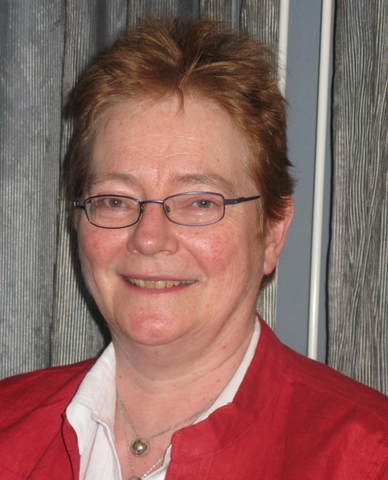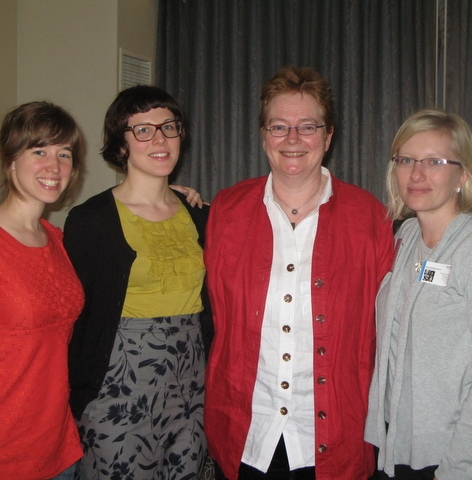Profile

Geraldine Moane
Birth:
1956
Training Location(s):
PhD, University of California, Berkeley (1995)
MSc, University College Dublin (1980)
BSc, University College Dublin (1977)
Primary Affiliation(s):
University College Dublin (1986-1987, 1988-present)
University of California, Berkeley (1987-1988)
Psychology’s Feminist Voices Oral History Interview:
Career Focus:
Liberation psychology; personality development; women's studies; lifespan development; sexuality; post-colonial psychology.
Biography
Geraldine Moane was born in Galway, Ireland in 1956, but has spent most of her life living, working, and studying in Dublin. Moane's childhood and family setting helped to shape her feminist identity, as she grew up in a large, equal opportunity household. Moane's parents did not adhere to conventional beliefs about gender roles. Both the boys and girls in the Moane family were subjected to the same expectations regarding housework and education.
The supportive environment fostered by her family encouraged Moane to pursue higher education. After completing her B.Sc. in psychology and computer science at University College Dublin (UCD), she continued on to a M.Sc. in psychology. It was during her undergraduate years that Moane became actively involved in feminist groups. After a run-in with a campus demonstration, Moane immediately signed up to become a member.
From her involvement in campus groups, Moane progressed to a more radical group known as Irish Women United. Here, she began to take part in more public demonstrations. One such event was the invasion of a public bath known as Forty Foot. This was a public bathing area that was restricted to men. Moane and her group were frustrated by the exclusion of women, and so they stormed the bath, forcing the men out. This event garnered national television coverage, and gave Moane a taste of radical feminism.
Following the completion of her Master's degree, Moane went to work for a research company. Eager to get out of Ireland and experience the world, Moane took advantage of a program offered by the company that provided funding to employees who wanted to earn their PhDs. After researching several schools, she applied for and was accepted to the University of California, Berkeley. During her time at Berkeley, Moane studied personality and lifespan developmental psychology. Her work with supervisor Ravenna Helson included a longitudinal study that looked at the development of creativity in women over several years.
After earning her PhD from Berkeley, Moane returned to Dublin and was quickly hired on by the psychology department of UCD. Although she was working within the psychology department, Moane was going through what she called and "anti-psychology phase," being very turned off by what she considered the oppressive nature of the field. She began taking an interest in women's studies, which, thanks to the work environment of UCD, she was freely allowed to explore while remaining a member of the psychology faculty.
From her work in women's studies, Moane and a few colleagues developed an outreach program in the 1990s. The goal of the program was to educate people who may not have access to university classrooms about women's studies. In preparation for this program, Moane received training in group work and participatory action.
Moane has published numerous articles, book chapters and special issues throughout her career. While teaching a course on the psychology of women, Moane became dissatisfied with the existing texts on the subject. This prompted her to begin work on her own book, which explored systems of domination and modes of control in oppression. She was also responsible for a special issue on feminist liberation psychology in Feminism & Psychology, which was a collaboration with psychologist Brinton Lykes. Their work on the special issue earned them a Distinguished Publication award from the Association of Women in Psychology in 2010.
Geraldine Moane continues to research and teach psychology in Ireland. She is a member of several liberation and equality groups, and serves as Chair of the Sexual Diversity and Gender Issues Special Interest Group.
by Meghan George (2011)
To cite this article, see Credits
Selected Works
Helson, R., & Moane, G. (1987). Personality changes in women from college to midlife. Journal of Personality and Social Psychology, 53, 176-186.
Moane, G. (2007). Building strength through challenging homophobia:Liberation Workshops with younger and midlife Irish lesbians. Journal of Gay and Lesbian Social Services, 20 (1/2) 71-88.
Moane, G. (2010). Sociopolitical development and political activism: Synergies between feminist and liberation psychology. Psychology of Women Quarterly, 34, 521-529.
Lykes, M. B. & Moane, G. (2009). (Eds.). Feminist Liberation Psychology. Special Issue, Feminism & Psychology, 19(3).
Lykes, M.B. & Moane, G. (2009). Whither Feminist Liberation Psychology? Critical explorations of feminist and liberation psychologies for a globalizing world. Feminism & Psychology, 19(3), 283-297.
Moane, G. (2011). Gender and colonialism: a psychological analysis of oppression and liberation (2nd Edition, 1st Edition: 1999). Basingstoke: Palgrave/Macmillan.
Photo Gallery


Geraldine Moane
Birth:
1956
Training Location(s):
PhD, University of California, Berkeley (1995)
MSc, University College Dublin (1980)
BSc, University College Dublin (1977)
Primary Affiliation(s):
University College Dublin (1986-1987, 1988-present)
University of California, Berkeley (1987-1988)
Psychology’s Feminist Voices Oral History Interview:
Career Focus:
Liberation psychology; personality development; women's studies; lifespan development; sexuality; post-colonial psychology.
Biography
Geraldine Moane was born in Galway, Ireland in 1956, but has spent most of her life living, working, and studying in Dublin. Moane's childhood and family setting helped to shape her feminist identity, as she grew up in a large, equal opportunity household. Moane's parents did not adhere to conventional beliefs about gender roles. Both the boys and girls in the Moane family were subjected to the same expectations regarding housework and education.
The supportive environment fostered by her family encouraged Moane to pursue higher education. After completing her B.Sc. in psychology and computer science at University College Dublin (UCD), she continued on to a M.Sc. in psychology. It was during her undergraduate years that Moane became actively involved in feminist groups. After a run-in with a campus demonstration, Moane immediately signed up to become a member.
From her involvement in campus groups, Moane progressed to a more radical group known as Irish Women United. Here, she began to take part in more public demonstrations. One such event was the invasion of a public bath known as Forty Foot. This was a public bathing area that was restricted to men. Moane and her group were frustrated by the exclusion of women, and so they stormed the bath, forcing the men out. This event garnered national television coverage, and gave Moane a taste of radical feminism.
Following the completion of her Master's degree, Moane went to work for a research company. Eager to get out of Ireland and experience the world, Moane took advantage of a program offered by the company that provided funding to employees who wanted to earn their PhDs. After researching several schools, she applied for and was accepted to the University of California, Berkeley. During her time at Berkeley, Moane studied personality and lifespan developmental psychology. Her work with supervisor Ravenna Helson included a longitudinal study that looked at the development of creativity in women over several years.
After earning her PhD from Berkeley, Moane returned to Dublin and was quickly hired on by the psychology department of UCD. Although she was working within the psychology department, Moane was going through what she called and "anti-psychology phase," being very turned off by what she considered the oppressive nature of the field. She began taking an interest in women's studies, which, thanks to the work environment of UCD, she was freely allowed to explore while remaining a member of the psychology faculty.
From her work in women's studies, Moane and a few colleagues developed an outreach program in the 1990s. The goal of the program was to educate people who may not have access to university classrooms about women's studies. In preparation for this program, Moane received training in group work and participatory action.
Moane has published numerous articles, book chapters and special issues throughout her career. While teaching a course on the psychology of women, Moane became dissatisfied with the existing texts on the subject. This prompted her to begin work on her own book, which explored systems of domination and modes of control in oppression. She was also responsible for a special issue on feminist liberation psychology in Feminism & Psychology, which was a collaboration with psychologist Brinton Lykes. Their work on the special issue earned them a Distinguished Publication award from the Association of Women in Psychology in 2010.
Geraldine Moane continues to research and teach psychology in Ireland. She is a member of several liberation and equality groups, and serves as Chair of the Sexual Diversity and Gender Issues Special Interest Group.
by Meghan George (2011)
To cite this article, see Credits
Selected Works
Helson, R., & Moane, G. (1987). Personality changes in women from college to midlife. Journal of Personality and Social Psychology, 53, 176-186.
Moane, G. (2007). Building strength through challenging homophobia:Liberation Workshops with younger and midlife Irish lesbians. Journal of Gay and Lesbian Social Services, 20 (1/2) 71-88.
Moane, G. (2010). Sociopolitical development and political activism: Synergies between feminist and liberation psychology. Psychology of Women Quarterly, 34, 521-529.
Lykes, M. B. & Moane, G. (2009). (Eds.). Feminist Liberation Psychology. Special Issue, Feminism & Psychology, 19(3).
Lykes, M.B. & Moane, G. (2009). Whither Feminist Liberation Psychology? Critical explorations of feminist and liberation psychologies for a globalizing world. Feminism & Psychology, 19(3), 283-297.
Moane, G. (2011). Gender and colonialism: a psychological analysis of oppression and liberation (2nd Edition, 1st Edition: 1999). Basingstoke: Palgrave/Macmillan.

